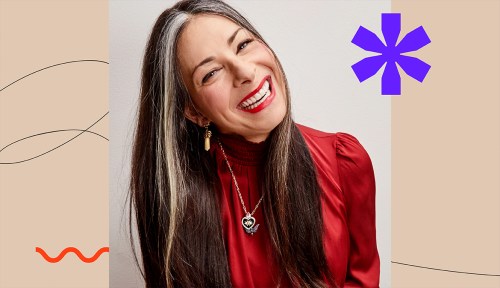How Stacy London’s Understanding of Feminism Has Evolved With Age
For Stacy London, the meaning of feminism has evolved throughout life. Here, learn what the terms means to the State of Menopause CEO.

I have been staring at this damn computer screen for hours. I agreed to write this essay about what feminism means to me, given my personal experience and perspective, because of course—why wouldn’t I? Now, upon reflection, I’m having trouble—which is alarming to me, as someone who has identified as a lifelong feminist.
I tried writing about what being menopausal and aging feels like in a culture that makes me feel irrelevant for being menopausal and aging. I tried writing about the history of women’s rights. I tried writing an homage to Florence Henderson and Mary Tyler Moore. I tried to remember all the things I used to say when bragging about my mom as a kid in the ‘70s: that she was a genius, that she was a badass, that she was a feminist.
But in the process of drafting this very piece, I’ve come to realize that I can no longer pinpoint what the concept of feminism mean to me—good, bad or otherwise.
How can that be? I’ve always considered myself to be an advocate for people who identify as women; for social, economic, political, and legal rights that are equal to those of people who identify as men. And given that’s the vaguely standard definition of a feminist, I’m surprised that it leaves me feeling cold rather than energized and proud, the way it did when I was a kid bragging about her trailblazing mom. So why does it leave me cold? Why aren’t I fighting for that term when we are still indeed fighting for all the components that make up its definition?
In reading other definitions of what “feminist” means online, I reached some personal clarity. Simply googling the term brought me Oxford’s definition, which reads “an advocate of women’s rights on the basis of equality of the sexes; a person who supports feminism.” But the contextualizing sample sentence underneath that definition is what spoke to me: “There are a million types of different women who consider themselves feminists, but don’t have the same agenda.”
People who identify as women are not a monolith, so their rights can’t be fought for and their equality achieved in one fell swoop.
I believe this has always been true—that people who identify as women are not a monolith, so their rights can’t be fought for and their equality achieved in one fell swoop. But, this reality has certainly not always been recognized, and, more importantly, not respected. This understanding of nuance highlights the difference between what I felt as a child and what I’ve learned through decades of lived experience, culminating most recently with my position as founder and CEO of State of Menopause.
I was originally taught, or perhaps I just assumed, that being a feminist meant fighting for woman-identifying people to have all the rights and privileges man-identifying people enjoy. As I’ve aged, this reductionist lens doesn’t do justice to what the fight for equality—and more, pressingly, equity—for all women might actually look like. The emphasis on equity is important because, to me, “a million types of different women” suggests exactly what it says: There is no one way to “be” a woman.
I am grateful that Kimberlé Crenshaw coined the term “intersectionality” in 1989, which originally aimed to describe the layered gender and racial discrimination that Black women experience. Since then, the term’s use has expanded to reflect more generally how different forms of prejudice can compound, including gender, sex, race, ethnicity, socio-economic class, age, disability, and more. With respect to feminism, intersectionality must be part of the discussion in order to serve the needs and experiences of the “million types of women.”
Furthermore, just as there are many types of women, being a woman can mean different things. For instance, the sex we are assigned at birth does not ultimately determine how we identify—no matter how we may present physically to others. Biological sex is also not the same as gender, and neither of those determine sexuality.
It’s exactly these issues and distinctions—among so many countless others—that make for different agendas with regard to the specifics of what feminism means. I now believe feminism isn’t just a fight for women’s rights to be equal to men’s. (Though, to be sure we stand on the shoulders of every person who has fought for and those who continue to fight for “a million types of different women” to have said rights.)
Rather, the fight is for any marginalized community that has been victimized by the patriarchy; by any system in place that disallows for equality. If we fight for the most marginalized of the marginalized, everyone wins. Everyone deserves equality and equity, which is easy to say but not easy to enact.
The word “feminism” was coined in 1837 by French philosopher Charles Fourier. (A man. Oh, the irony.) It’s 152 years old. By contrast, Crenshaw’s word is a young and healthy 33. Evolution takes time, but it is always happening. So now, and in honor of Women’s History Month, you can call me an “intersectional feminist.” Because that resonates. And because I think my mom would agree.
Oh hi! You look like someone who loves free workouts, discounts for cutting-edge wellness brands, and exclusive Well+Good content. Sign up for Well+, our online community of wellness insiders, and unlock your rewards instantly.
Sign Up for Our Daily Newsletter
Get all the latest in wellness, trends, food, fitness, beauty, and more delivered right to your inbox.
Got it, you've been added to our email list.









